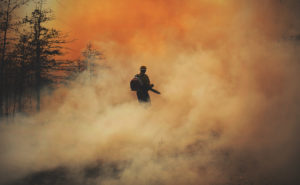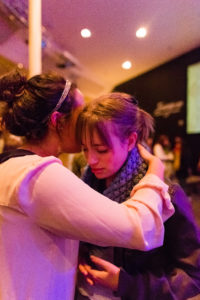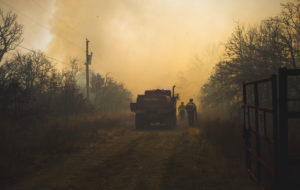 Last month, as the flames were raging in Fort McMurray, Alberta, a CBC radio producer contacted me and asked if I’d be willing to do an interview on the role of faith in the face of this fiery disaster.
Last month, as the flames were raging in Fort McMurray, Alberta, a CBC radio producer contacted me and asked if I’d be willing to do an interview on the role of faith in the face of this fiery disaster.
As we corresponded I began to see where he wanted the interview to go – a few thoughts on why ‘Acts of God’ happen, some words on how the church was praying, volunteering, giving money and providing spiritual support for the evacuees, and then a closing nudge to a webpage where listeners could make a donation.
The problem was, I didn’t want to talk about those things.
Because that wasn’t where I was seeing faith in God at work in those tragic circumstances.
From my perspective, faith was being expressed in all kinds of very real and unconventional ways, and God was responding to those acts of faith via means that were quite outside of the institution of the church. God’s presence was everywhere.
This had a lot to do with my very literal understanding of the doctrine of creation. Like many Christians, I believe that everything has been made by God, through Christ, and is held together by the Holy Spirit. Only for me everything really means everything; including nature, human nature, current events, societal structures, governments, first responders, news agencies, national economies and boreal forest fire patterns. And I believe, as the Bible clearly illustrates, that God moves, works and speaks through all that he has made.
For me, both the fire and the exodus were a kind of parable.
Interestingly I had recently preached sermons on much of the creation that played a part in the Fort McMurray story; firefighters, police officers, Premier Rachel Notley, governments, journalists, natural disasters, and insurance companies (to name a few). Each of these elements of creation was a means through which God was responding to all of the unconventional acts of faith being expressed by all of the fleeing people (most of whom, I’m sure, were not part of a formal ‘church’).
Think of the trust that dislodged evacuees were showing as they accepted a bottle of water, some gasoline or a tow from total strangers while being stuck in a gridlocked exodus, or the mostly calm obedience of every Fort Mac resident as they dutifully followed the directions of civic leaders and emergency response workers, or the strength that so many unsettled souls hung onto as they took in all of the tweets and Facebook posts saying, “We’re with you… you’re not alone… we’ll help you through this!”
And what about the hope that so many displaced residents are now placing in their insurance companies; trusting that their coverage will be good, and that their insurers will come through and make them whole again, or people’s willingness to be physically sheltered by others; fed and protected by individuals, families, and oil companies.
Even the city of Fort McMurray has had to put its faith in the promises of a province that is trusting in the promises of a federal government that is trusting in the hearts of all Canadian people, to be there over the long haul.
And in response to all of these unconventional expressions of faith, God answered in ways that were much bigger than any church ever could.
Through every human heart that innately felt the desire to help – to do for others what they would want to have done for them, to love their neighbours as they love themselves – God’s heart was beating.
 As firefighters fearlessly run toward the flames and shield vulnerable families, we see evidence of a God who shelters us from calamity; who takes a risk and stands in the gap and makes a way for his people.
As firefighters fearlessly run toward the flames and shield vulnerable families, we see evidence of a God who shelters us from calamity; who takes a risk and stands in the gap and makes a way for his people.
When police officers stick to their posts and direct traffic even as the forest is exploding nearby, when they provide order in the midst of chaos, we’re seeing evidence of God’s serving and protecting heart. God created a society that would come up with the idea of policing, so that we’d be protected from our baser instincts, and to keep traffic flowing.
And then consider the role that government has played in responding to this crisis. Here we have an institution that thought ahead and put a disaster response plan in place, representative of the people whose job it is to stand up for the displaced, and to funnel a nation’s worth of resources to help; a greater power with deep pockets imaging the God of all power and resources.
Think about the crucial role that insurance in now playing in this unfolding story. Without it people would be wiped out! But because we came up with the idea of the collective helping the individual in times of catastrophe – yet another way that society images God’s communal heart for desperate, lost and broken souls – thousands of lives have been economically saved. Every time we pay a premium we are participating in God’s life saving insurance work.
As I sat in the CBC recording studio, I told the interviewer that even the work he was doing was being used by God to help. Like a good journalist, God’s cares about people’s stories; he wants to get the news out about those in need, he knows what they’re going though, takes account of their pain and suffering, and records all of their tears.
This is what God is like. And this is how he works in our world.
God takes strangers in. He cares about the needy, the suffering, those without a home. God sees what’s happening, just as the world has been watching Fort Mac these past weeks. God moves through the ecology that he’s made; through a forest fire that has both naturally and mysteriously affirmed our human frailty and vulnerability, and through the amazing nature of a human society with so much capacity to respond to, overcome, and rebuild from disaster.
Sure, God has been working through faith-based institutions as well over this past month, but I think his biggest moves have been made through the rest of his good creation, through everyday people, organizations and government agencies, all doing what they were meant to do; all bearing God’s disaster response image in all of these life saving ways.







